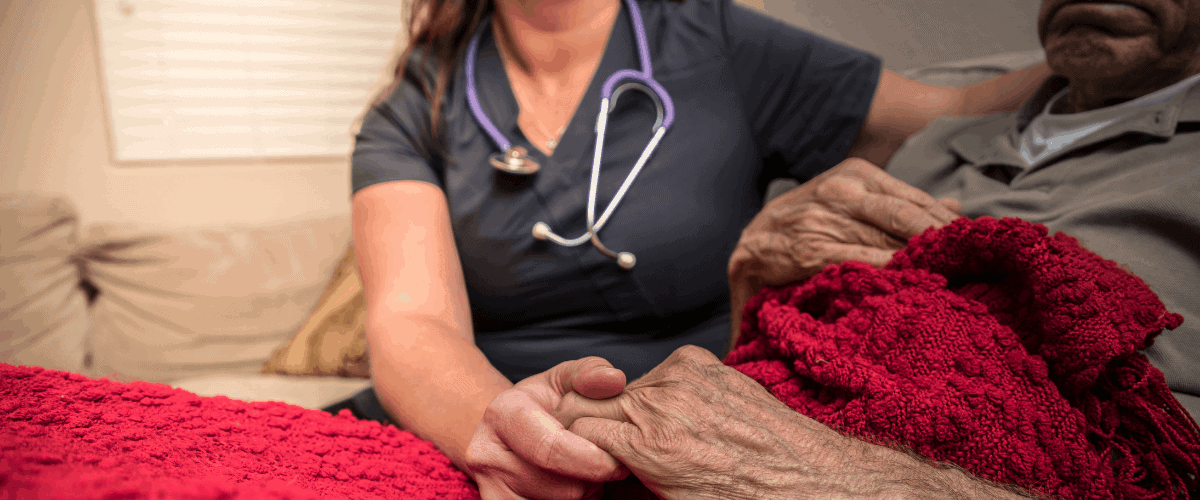If you have an outpatient hospice patient, you need to pay attention to their mental health. Recently, awareness surrounding mental health problems and their impact on overall health has increased.
This is important. The reason is that studies suggest that one in four people will suffer a mental health issue at some point in their lives.
Despite these suggestions, there is a continuous decrease in funding for mental health services. Sometimes, this has caused patients with mental issues to seek treatment from alternative sources.
If you or your loved one (with a terminal illness) needs mental health services? Considering outpatient hospice care might be a good option.
Outpatient Hospice Problems – Mental Illness Vs. Terminal Illness
Firstly, terminal and chronic illnesses are highly triggering and often cause the development of mental illnesses. Furthermore, records show that over 10% of suicides in Britain are linked to a chronic or terminal illness.
There are even scenarios where a patient went into a psychotic episode, attacked a hospice staff member, and attempted to leave an Inpatient Unit. In general, people feel more comfortable at home, provided that they are monitored and assisted by a trained hospice service personnel.
Also, more studies indicate that patients with diagnosed mental illness tend to die earlier. They are also more likely to develop terminal and chronic diseases and suffer from loneliness and isolation, increasing their chances of dying by 26%.
Similarly, more problems with mental illness include poor diet and exercise. Inadequate health monitoring increases the likelihood of heart and lung problems. It causes an increase in impulsivity which can increase the likelihood of substance misuse, resulting in long-term health problems such as cancer.
How To Best Help Outpatient Hospice Patients With Mental Health Issues
1) Hospice Providers Should Be Well Trained
One of the basic principles of hospice care is holistic medicine. The need for holistic medicine makes it vital for patients referred to hospice service to be attended to by only well-equipped staff.
Frequently, patients who are referred to poor hospice providers without training cannot handle all of a patients’ needs adequately.
Our staff members regularly have training on:
- Advanced Communication Skills
- Conflict Resolution
- Dementia Patient Support
- Level Two Mental Health Conditions (providing emotional support)
- Cognitive Behavioral Therapy (CBT) training (for staff members who tend to care for long-term patients).
These various training techniques are to be used in conjunction with holistic emotional support.

2) Services related to the mental health
The best way to help an outpatient hospice patient with mental health illness is intentionally dishing out specified mental health services related to mental health problems.
Comprehensive mental health services, as generally defined under some national (or state) laws and statutes, include:
- Inpatient care, outpatient care, daycare, and other partial hospitalization and emergency services.
- Specialized services for the mental health of the elderly.
- Consultation and education services and specialized programs for the prevention, treatment, and rehabilitation of alcohol and drug abusers.
The services also generally include various services provided to people of all ages: counseling, psychotherapy, psychiatric services, crisis intervention, and support groups.
The common issues addressed with this service include depression, grief, anxiety, stress, and severe mental illnesses.
3) Treatment Planning
Mental illnesses manifest themselves in a highly individual manner. Therefore, a good outpatient hospice care must ensure proper drafting of its treatment plan. For example:
Learning the Developmental Disorders of A Patient’s Mental Health Issues
The member’s staff of outpatient hospice care needs to be aware of all aspects of their patient’s mental health illness.
When they do, it’s easier for them to help a patient accept their true fate. But most importantly, it opens up an excellent way to work individually with the patient.
This way, the patient can be taught daily about his illness and how it would manifest to approach it with peace. Then subsequently, make progress on improving the patient’s problems.
Dealing With Personality Disorders
One-on-one nursing is vital in these kinds of situations. Mainly to help build trust and rapport with the outpatient hospice patients.
Take, for instance, a patient with a dual diagnosis of borderline personality disorder and curable breast cancer. This kind of patient may refuse any type of treatment due to a childhood trauma involving surgery.
Should good hospice care give up? Surely they won’t. Instead, an occupational therapy nurse can patiently stay with this patient to gain her trust in hospice services in this kind of situation.
If this is done well, the patient can agree to go for chemotherapy. Then, later on, she can access the appropriate mental health services.
Conclusion
Mental Health illness includes all forms of the disease in which psychological, emotional, or behavioral disturbances are the dominating feature.
The term is relative and variable in different cultures, schools of thought, and definitions.
Well, no hospice care needs to be lost on helping hospice patients deal with mental health problems.
Every hospice service, whether inpatient, outpatient, or all the likes, must handle the mental health illness of all its patients effectively.
The ways to do this are detailed and pointed out in this article. Follow them and render better services to your mental health hospice patients.
References:




